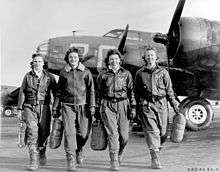Pistol Packin' Mama

"Pistol Packin' Mama" is a 1943 song with the words composed by Al Dexter, who adapted the melody from Boil Them Cabbage Down.[1] The song is notable in that it was the first number one on the Juke Box Folk Records chart, which was later known as the Hot Country Songs chart. The version performed by Bing Crosby and the Andrews Sisters[2] was the first number on the Juke Box Folk records charts followed by the original version (recorded March 18, 1942) performed by Al Dexter[3] released on Okeh 6708.[1] The B-side of the Al Dexter version of "Pistol Packin' Mama, a song entitled "Rosalita", would hit number one on the same chart later in the year. The song is also featured in the video game Fallout 4 on the in-game radio.
Patty Andrews recalled that she and her sisters were quite amused and had to restrain their laughter when Crosby ad libbed "lay that thing down before it goes off and hurts somebody."[2]
The Pied Pipers ft. Jo Stafford with Paul Weston & His Orchestra on Capitol Records – 140 (September 27, 1943)
Louis Jordan was performing a "hillbilly rendition" of the song, which drew laughs, during a November 1943 appearance in a show at the Orpheum Theater in Los Angeles.[4]
Gene Vincent's 1960 British hit version features Georgie Fame on piano.
The Flamin' Groovies did a cover the song on their 1969 debut album Supersnazz.
The chorus of the song was used for the 1970s UK television advertising campaign for Rowntree's Fruit Pastilles, with the punning tag line "Pastille Pickin' Mama, pass those pastilles round".[5]
There is also a version of the song on an album titled A.P.C. Presents: The Unreleasable Tapes with Bryan Adams being credited with the lead vocals.[6]
It is also continually referenced in Spike Milligan's "Goodbye Soldier", which is part of his memoirs of the war and just after it. In it he states that as Mussolini did not like Jazz, after he was defeated the Italians were getting into Jazz, and as this song was popular at the time this was one of the songs Milligan and his group was often asked to sing, he also states that this is one of the main songs sung by Italian Jazz Bands (in fact he states that some bands only ever sung this song)
References
- 1 2 Abrams, Steven and Settlemier, Tyrone. "The Online Discographical Project – Okeh (CBS) 6500 - 6747 (1941 - 45)". Retrieved February 21, 2011
- 1 2 Gilliland, John (1994). Pop Chronicles the 40s: The Lively Story of Pop Music in the 40s (audiobook). ISBN 978-1-55935-147-8. OCLC 31611854. Tape 1, side A.
- ↑ Whitburn, Joel (2004). The Billboard Book Of Top 40 Country Hits: 1944-2006, Second edition. Record Research. p. 535.
- ↑ Billboard Nov 27, 1943. page 23
- ↑ "Rowntree’s Fruit Pastilles (3): 1972" at eadington.org.uk
- ↑ emusic.com
| Preceded by - |
Most Played Juke Box Folk Records number one single by Bing Crosby and The Andrews Sisters January 8, 1944 - January 29, 1944 (four weeks) March 18, 1944 |
Succeeded by "Pistol Packin' Mama" by Al Dexter "They Took the Stars Out of Heaven" by Floyd Tillman |
| Preceded by "Pistol Packin' Mama" by Bing Crosby and The Andrews Sisters |
Most Played Juke Box Folk Records number one single by Al Dexter February 5, 1944 - February 19, 1944 (three weeks) |
Succeeded by "Ration Blues" by Louis Jordan |
| Preceded by "Sunday, Monday, or Always" by Bing Crosby |
number-one single according to Billboard magazine October 30, 1943 |
Succeeded by "Paper Doll" by Mills Brothers |